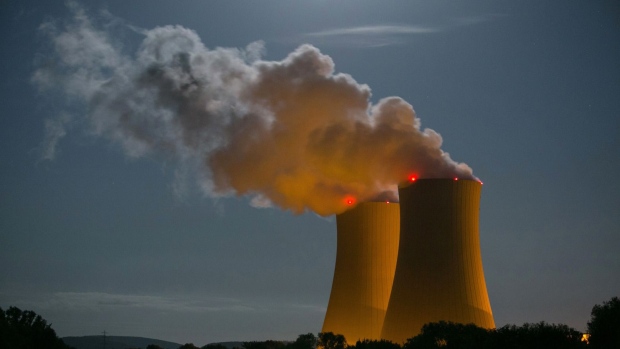Oct 17, 2022
Germany to Extend Lifetime of All Three Nuclear Power Plants
, Bloomberg News

(Bloomberg) -- Germany extended its last three nuclear power plants beyond the end of this year after Chancellor Olaf Scholz put an end to a coalition spat that threatened efforts to deal with an unprecedented energy crisis.
In a dramatic reversal of an earlier decision by Economy Minister Robert Habeck, Scholz ordered Germany’s remaining reactors to remain in operation until mid-April next year at the latest.
The extension of about 100 days provides only small relief to Germany’s energy supplies. The plants, which provided less than 12% of the country’s power last year, will remain connected to the grid and can help offset periods when other generation is low or when demand peaks.
Scholz’s highly unusual move late Monday to deploy his powers as chancellor is designed to end a standoff between his two coalition partners, the Greens and the Liberals. The dispute showed cracks in the alliance after less than a year in power and exposed the deep policy differences between the parties.
While Habeck’s Greens are ideologically opposed to nuclear power, the business-friendly Free Democrats led by Finance Minister Christian Lindner insisted that Germany should use all the generation capacity available to tackle the crisis.
Habeck, who is responsible for energy in the cabinet, had initially planned for only two of the three remaining plants to operate until April at the latest. The rationale was that EON SE’s Isar 2 and EnBW AG’s Neckarwestheim 2, which are both in southern Germany, could help stabilize supplies in the region, while RWE AG’s Emsland, in the northern state of Lower Saxony, wasn’t crucial.
Lindner, who had pushed for all three to run until 2024, welcomed Scholz’s move.
“It is in the vital interest of our country and its economy that we maintain all power generation capacity this winter,” Lindner said in a statement. “The chancellor has now provided clarity.”
The dispute escalated after the Greens -- the second-biggest party in the coalition after Scholz’s Social Democrats -- reaffirmed their opposition to the plan by voting against an extension of nuclear power at a party convention last weekend.
“It’s unfortunate that Scholz and the SPD are apparently willing to put the Emsland nuclear power plant into reserve operation,” Katharina Droege, head of the Greens parliamentary group, said on Twitter. “There is no objective reason for this.”
Habeck appeared to strike a pragmatic tone in an interview with public broadcaster ARD late Monday. He described Scholz’s decision as a “proposal,” which he could work on and live with. He added the plan was not without some risks, but he would now support this path.
Germany agreed to the current timeline to phase out nuclear power in the aftermath of the Fukushima disaster in 2011, but Scholz’s government has come under mounting pressure to shore up alternative sources of energy that don’t use natural gas after Russia slashed supplies.
Even though Germany’s gas-storage facilities are more than 95% full, the grid operator has warned that it may not be enough to cope with winter demand. The nation’s four transmission operators had also called for all three plants to be kept running until spring to ease Germany’s power crunch.
Grid operators will be monitoring tight periods this winter when temperatures drop or during periods of low wind when demand is expected to be high. The nuclear plants could help in these crunch times, potentially leading to lower prices.
The decision is a “smart compromise” to safeguard energy supplies, Klaus Mueller, president of the Federal Network Agency, said on Twitter.
(Updates with Economy Minister Habeck comment in seventh paragraph.)
©2022 Bloomberg L.P.







